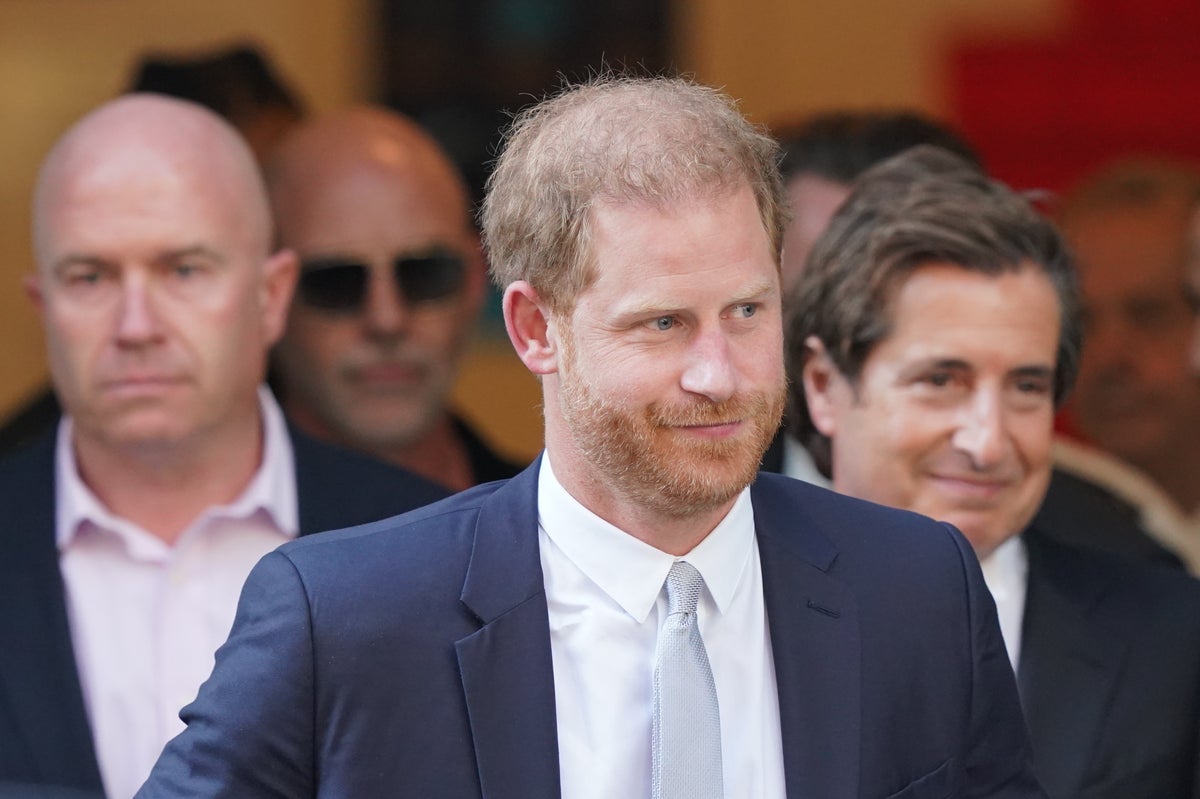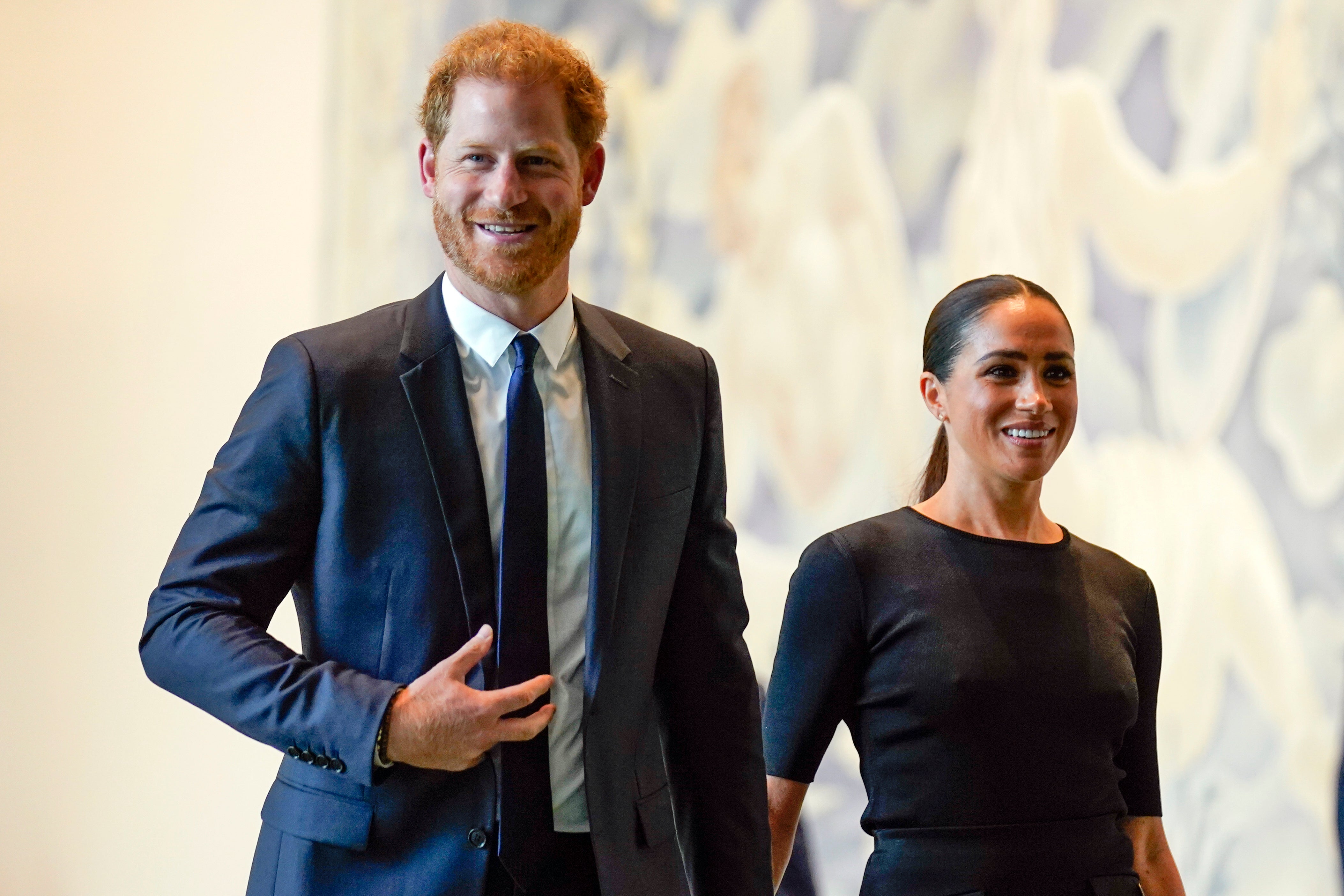
Prince Harry was repeatedly asked to provide “hard evidence” to support his newspaper phone hacking claims on Wednesday, as he told the High Court he brought the case to protect his wife Meghan from abuse.
Despite his suspicions of widespread hacking, the Duke of Sussex said he “didn’t know” the answer to questions put to him by Mirror Group Newspapers (MGN) lawyer Andrew Green KC 18 times in just three hours.
The 38-year-old prince accused publishers of “industrial-scale destruction of evidence” and blamed a lack of call data on the alleged use of “burner” phones, of which no record would be kept.
“I believe phone-hacking was on an industrial scale across at least three of the papers at the time and that is beyond doubt,” he told the court.
Citing Meghan as his chief motivation for taking legal action over alleged illegal information-gathering, Harry admitted he would feel “some injustice” if his claim was unsuccessful. At one point during his evidence, Harry appeared choked up as he addressed the personal toll of his time in the witness box.
But asked by Mr Green about a lack of evidence to prove illegal information-gathering, Harry replied: “I think that is a question for my legal team.
“There is hard evidence to suggest an incredible amount of suspiciousness and I believe that burner phones were used extensively.”
When asked if there was a particular voicemail that he believes was intercepted, he answered: “I can’t remember a specific voicemail that I left over the last 20 years.”
This alleged intrusion – which he told the court “could” have been happening for 15 years – prompted him to act to try and stop the “abuse and intrusion” affecting Meghan without having to rely on the royal family’s lawyers.
He said: “I think [the current legal action] was a discussion about how to find a way to stop the abuse and intrusion that was coming against me and my wife… without relying on the institution’s lawyers.”
During questioning, Harry also alleged that he found a tracking device on his ex-girlfriend Chelsy Davy’s car when the pair were on a “make or break” holiday in South Africa in the mid-2000s.

He said it was placed there by private investigator Mike Behr – who he also blamed for targeting him on other occasions – before he claimed another device was found on his own car by a friend.
When his barrister David Sherborne asked how he could be sure what it was, he said: “Because we found it”
Harry claimed that press intrusion led to him breaking up with Ms Davy in 2009.
He also said he believed articles about his brief relationship with the late TV presenter Caroline Flack were obtained by phone hacking.
The duke is among four figures seeking damages from the publisher, claiming journalists at titles including the Daily Mirror, Sunday Mirror and Sunday People, were linked to methods including phone hacking, so-called “blagging” or gaining information by deception, and use of private investigators for unlawful activities.
MGN denies all his claims, although it has previously admitted phone hacking did take place at its titles but says the duke was never a target.
During hours of cross-examination by Mr Green, Harry accused Piers Morgan – editor of the Mirror between 1995 and 2004 – of “horrific personal attacks and intimidation”.
He has previously accused him of being aware of phone hacking while at the Mirror – something Morgan has always denied.
Harry also suggested newspaper stories claiming his father was Princess Diana’s former lover James Hewitt were aimed at ousting him from the royal family.

To back his claims, he told the court how voice messages on his phone would not appear to be new, even if he had not heard them – or the “new mail” icon on the screen would disappear.
“Can you help by identifying when ... you experienced this strange activity?” asked the judge.
“From the moment I had a mobile phone,” replied Prince Harry – meaning around the time he went to Eton as a teenager.
This prompted the judge to ask: “Are you saying this continued throughout the period?”
“It never stopped,” the duke replied.
As he prepared to leave the dock, Harry appeared to choke up when his barrister asked him about the toll his appearance in court has taken.
“It’s a lot,” he said, in a cracked voice.
After giving his evidence, Harry stayed in court to watch the Mirror’s former royal editor and assistant news editor Jane Kerr give evidence.
In her witness statement, Ms Kerr has described calling various agencies who provided phone numbers the paper needed to cover breaking news.
Ms Kerr said she “knew what she was doing but it was a long time ago”, after Mr Sherborne claimed she seemed “to have no idea of what you were doing at the time”.
Pressing further, the barrister asked: “You called up people, you had no idea what they did – they magically produced phone numbers and you never asked any questions?”, to which Ms Kerr replied: “Yes.”
In total, Harry alleges about 140 articles published by MGN between 1996 and 2010 contained information gathered using unlawful methods, and 33 of these have been selected to be considered at the trial.
The other claimants are Coronation Street actor Michael Turner, known professionally as Michael Le Vell, who is best known for playing Kevin Webster, former Coronation Street actor Nikki Sanderson, and comedian Paul Whitehouse‘s ex-wife Fiona Wightman.
MGN is contesting the claims and has either denied or not admitted each of them.
The publisher also argues that some of the claimants have brought their legal action too late.
The trial continues.






